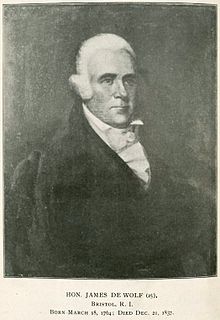James DeWolf
| James DeWolf | |
|---|---|
 |
|
|
United States Senator from Rhode Island |
|
|
In office March 4, 1821 – October 31, 1825 |
|
| Preceded by | William Hunter |
| Succeeded by | Asher Robbins |
| Member of the Rhode Island House of Representatives | |
|
In office 1798 – 1801 1803 – 1812 1817 – 1821 1829 – 1837 |
|
| Personal details | |
| Born |
March 18, 1764 Bristol, Rhode Island |
| Died | December 21, 1837 (aged 73) New York City, New York |
| Political party | Democratic-Republican |
| Spouse(s) | Nancy Ann Bradford DeWolf |
| Profession | Politician, Captain, Slaver |
James DeWolf (March 18, 1764 – December 21, 1837) was a slave trader, a privateer during the War of 1812, and a state and national politician. He gained notoriety in 1791 when indicted for murdering a slave said to have smallpox, whom he said threatened the lives of all of the other slaves and crew because of the disease. The case was ultimately dismissed and was considered justifiable under contemporary law. During his lifetime, his name was usually written "James D’Wolf".
He served as a state legislator for a total of nearly 25 years, and in the 1820s as a United States senator from Rhode Island for much of a term. Along with the slave trade, DeWolf invested in sugar and coffee plantations in Cuba and became the wealthiest man in his state; by the end of his life, he was said to be the second-richest person in the entire United States.
James DeWolf was born in Bristol, Rhode Island, in 1764 to Mark Anthony DeWolf (1726-1792) and his wife, Abigail Potter (1726-1809). He had brothers: Charles, John, William and Levi DeWolf. Their father and uncle Simeon Potter were slave traders before the American Revolutionary War. James DeWolf went to sea at an early age, shipping as a sailor on a private armed vessel during the late years of the American Revolutionary War. He participated in several naval encounters and was captured twice by the British.
After the war, DeWolf was selected as captain of a ship in his 20s. He began to engage in commercial ventures, including slave trading, often purchasing seasoned slaves from Cuba and other ports in the West Indies and transporting them primarily to southern markets in the United States. His father and uncle had been involved in slave trading since 1769. Although Rhode Island outlawed slave trading in 1787, DeWolf and his family continued to finance and command slaving voyages to West Africa.
In 1790, DeWolf married Nancy Ann Bradford, the daughter of William Bradford, deputy governor and a future U.S. senator from Rhode Island. They had a family together, including a daughter Abby DeWolf.
...
Wikipedia
